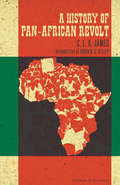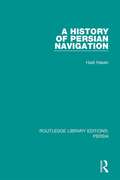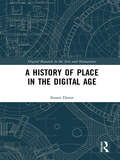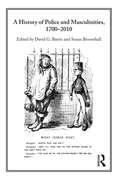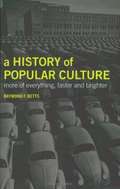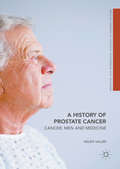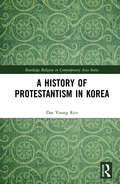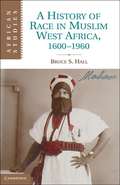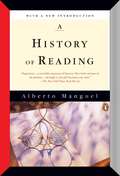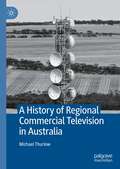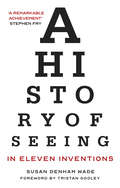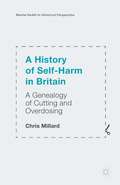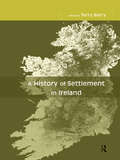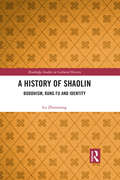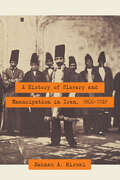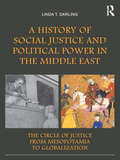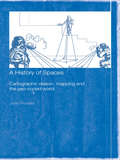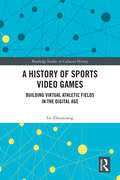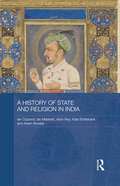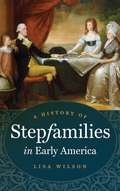- Table View
- List View
A History of Pan-African Revolt (The Charles H. Kerr Library)
by Robin D. G. Kelley C. L. R. JamesOriginally published in England in 1938 and expanded in 1969, this work remains the classic account of global Black resistance. This concise, accessible history of revolts by African peoples worldwide explores the wide range of methods used by Africans to resist oppression and the negative effects of imperialism and colonization as viewed in the 20th century. Written from a radical perspective with a substantial new introduction that contextualizes the work in the ferment of the times, A History of Pan-African Revolt is essential to understanding liberation movements in Africa and the diaspora and continues to reveal new insights, lessons, and visions to successive generations.
A History of Persian Navigation (Routledge Library Editions: Persia #3)
by Hadi HasanThis book, first published in 1928, is based on Chinese, Persian and Arabic sources, and provides the first scholarly account of the history of Persian maritime exploration.
A History of Place in the Digital Age (Digital Research in the Arts and Humanities)
by Stuart DunnA History of Place in the Digital Age explores the history and impact of Geographic Information Systems (GIS) and related digital mapping technologies in humanities research. Providing a historical and methodological discussion of place in the most important primary materials which make up the human record, including text and artefacts, the book explains how these materials frame, form and communicate location in the age of the internet. This leads in to a discussion of how the World Wide Web distorts and skews place, amplifying some voices and reducing others. Drawing on several connected case studies from the early modern period to the present day, the spatial writings of early modern antiquarians are explored, as are the roots of approaches to place in archaeology and philosophy. This forms the basis for a review of place online, through the complex history of the invention of the internet, in to the age of the interactive web and social media. By doing so, the book explores the key themes of spatial power and representation which these technologies frame. A History of Place in the Digital Age will be of interest to scholars, students and practitioners in a variety of humanities disciplines with an interest in understanding how technology can help them undertake research on spatial themes. It will be of interest as primary work to historians of technology, media and communications.
A History of Police and Masculinities, 1700-2010
by Susan Broomhall David G. BarrieThis unique collection brings together leading international scholars to explore how ideologies about masculinities have shaped police culture, policy and institutional organization from the eighteenth century to the present day. It addresses an under-researched area of historical inquiry, providing the first in-depth study of how gender ideologies have shaped law enforcement and civic governance under ‘old’ and ‘new’ police models, tracing links, continuities, and changes between them. The book opens up scholarly understanding of the ways in which policing reflected, sustained, embodied and enforced ideas of masculinities in historic and modern contexts, as well as how conceptions of masculinities were, and continue to be, interpreted through representations of the police in various forms of print and popular culture. The research covers the UK, Europe, Australia and America and explores police typologies in different international and institutional contexts, using varied approaches, sources and interpretive frameworks drawn from historical and criminological traditions. This book will be essential reading for academics, students and those in interested in gender, culture, police and criminal justice history as well as police practitioners.
A History of Popular Culture: More of Everything, Faster, and Brighter
by Raymond F. BettsThis lively and informative survey provides a thematic global history of popular culture focusing on the period since the end of the Second World War. Raymond Betts considers the rapid diffusion and "hybridization" of popular culture as the result of three conditions of the world since the end of World War Two: instantaneous communications, widespread consumption in a market-based economy and the visualization of reality. Betts considers the dominance of American entertainment media and habits of consumption, assessing adaptation and negative reactions to this influence. The author surveys a wide range of topics, including the effects of global conflict, the effects of urbanization and the growth of sport as a commercial enterprise.
A History of Prejudice
by Gyanendra PandeyThis is a book about prejudice and democracy, and the prejudice of democracy. In comparing the historical struggles of two geographically disparate populations - Indian Dalits (once known as Untouchables) and African Americans - Gyanendra Pandey, the leading subaltern historian, examines the multiple dimensions of prejudice in two of the world's leading democracies. The juxtaposition of two very different locations and histories, and within each of them of varying public and private narratives of struggle, allows for an uncommon analysis of the limits of citizenship in modern societies and states. Pandey, with his characteristic delicacy, probes the histories of his protagonists to uncover a shadowy world where intolerance and discrimination are part of both public and private lives. This unusual and sobering book is revelatory in its exploration of the contradictory history of promise and denial that is common to the official narratives of nations such as India and the United States and the ideologies of many opposition movements.
A History of Prostate Cancer: Cancer, Men and Medicine (Medicine and Biomedical Sciences in Modern History)
by Helen ValierThis book offers a comprehensive and inclusive insight into the history of prostate cancer and its sufferers. Until recently, little practical help could be offered for men afflicted with the devastating diseases of the genitourinary organs. This is despite complaints of painful urination from aging men being found in ancient medical manuscripts, despite the anatomical discoveries of the European Renaissance and despite the experimental surgical researches of the eighteen and nineteenth centuries. As diseases of the prostate, including prostate cancer, came to be better understood in the early twentieth century, therapeutic nihilism continued as curative radical surgeries and radiotherapy failed. The therapeutic 'turn' came with hormonal therapies, itself a product of the explosive growth of U. S. biomedicine from the 1940s onwards. By the 1990s, prostate cancer screening had become a somewhat ubiquitous but controversial feature of the medical encounter for American men as they aged, which greatly influenced the treatment pathways and identity of the male patient: as victim, as hero, and ultimately, as consumer.
A History of Protestantism in Korea (Routledge Religion in Contemporary Asia Series)
by Dae Young RyuThis book provides a comprehensive overview of Protestant Christianity in Korea. It outlines the development of Christianity in Korea before Protestantism, considers the introduction of Protestantism in the late nineteenth century and its widening and profound impact, and goes on to discuss the situation up to the present. Throughout the book emphasises the importance of Protestantism for Korean national life, highlights the key role Protestantism has played in Korea’s social, political, and cultural development, including in North Korea whose first leader Kim Il Sung was the son of devout Protestant parents, and demonstrates how Protestantism continues to be a vital force for Korean society overall.
A History of Race in Muslim West Africa, 1600–1960
by Bruce S. HallThe mobilization of local ideas about racial difference has been important in generating, and intensifying, civil wars that have occurred since the end of colonial rule in all of the countries that straddle the southern edge of the Sahara Desert. From Sudan to Mauritania, the racial categories deployed in contemporary conflicts often hearken back to an older history in which blackness could be equated with slavery and non-blackness with predatory and uncivilized banditry. This book traces the development of arguments about race over a period of more than 350 years in one important place along the southern edge of the Sahara Desert: the Niger Bend in northern Mali. Using Arabic documents held in Timbuktu, as well as local colonial sources in French and oral interviews, Bruce S. Hall reconstructs an African intellectual history of race that long predated colonial conquest, and which has continued to orient inter-African relations ever since.
A History of Reading
by Alberto ManguelA History of Reading is a wonderful celebration of the one invention that has done most for the human race. From clay tablets to CD-ROM, from book thieves to book burners, bibliophiles, book fools and saints, noted essayist Alberto Manguel follows the quirky and passionate 4000-year-old history of the written word whose true hero is the reader. For those who love reading, this, at long last, is their story.
A History of Reading
by Alberto ManguelAt one magical instant in your early childhood, the page of a book--that string of confused, alien ciphers--shivered into meaning. Words spoke to you, gave up their secrets; at that moment, whole universes opened. You became, irrevocably, a reader. Noted essayist Alberto Manguel moves from this essential moment to explore the 6000-year-old conversation between words and that magician without whom the book would be a lifeless object: the reader. Manguel lingers over reading as seduction, as rebellion, as obsession, and goes on to trace the never-before-told story of the reader's progress from clay tablet to scroll, codex to CD-ROM.
A History of Reading
by Alberto ManguelAt one magical instant in your early childhood, the page of a book--that string of confused, alien ciphers--shivered into meaning, and at that moment, whole universes opened. You became, irrevocably, a reader. Noted essayist and editor Alberto Manguel moves from this essential moment to explore the six-thousand-year-old conversation between words and that hero without whom the book would be a lifeless object: the reader. Manguel brilliantly covers reading as seduction, as rebellion, and as obsession and goes on to trace the quirky and fascinating history of the reader's progress from clay tablet to scroll, codex to CD-ROM.
A History of Regional Commercial Television in Australia
by Michael ThurlowThis book is the first history of commercial television in regional Australia, where diverse communities are spread across vast distances and multiple time zones. The first station, GLV Latrobe Valley, began broadcasting in December 1961. By the late 1970s, there were 35 independent commercial stations throughout regional Australia, from Cairns in the far north-east to Bunbury in the far south-west. Based on fine-grained archival research and extensive interviews, the book examines the key political, regulatory, economic, technological, industrial, and social developments which have shaped the industry over the past 60 years. Regional television is often dismissed as a mere extension of – or footnote to – the development of Australia’s three metropolitan commercial television networks. Michael Thurlow’s study reveals an industry which, at its peak, was at the economic and social heart of regional communities, employing thousands of people and providing vital programming for viewers in provincial cities and small towns across Australia.
A History of Seeing in Eleven Inventions: A History of Seeing
by Tristan Gooley Susan Denham Wade'A remarkable achievement' - Stephen FryIn 2015 #thedress captured the world’s imagination. Was the dress in the picture white and gold or blue and black? It inspired the author to ask: if people in the same time and place can see the same thing differently, how did people in distant times and places see the world?Jam-packed with fascinating stories, facts and insights and impeccably researched, A History of Seeing in Eleven Inventions investigates the story of seeing from the evolution of eyes 500 million years ago to the present day. Time after time, it reveals, inventions that changed how people saw the world ended up changing it altogether.Twenty-first-century life is more visual than ever, and seeing overwhelmingly dominates our senses.Can our eyes keep up with technology? Have we gone as far as the eye can see?
A History of Self-Harm in Britain: A Genealogy of Cutting and Overdosing (Mental Health in Historical Perspective)
by Chris MillardThis book is open access under a CC BY license and charts the rise and fall of various self-harming behaviours in twentieth-century Britain. It puts self-cutting and overdosing into historical perspective, linking them to the huge changes that occur in mental and physical healthcare, social work and wider politics.
A History of Settlement in Ireland
by Terry BarryA History of Settlement in Ireland provides a stimulating and thought-provoking overview of the settlement history of Ireland from prehistory to the present day. Particular attention is paid to the issues of settlement change and distribution within the contexts of:* environment* demography* culture.The collection goes further by setting the agenda for future research in this rapidly expanding area of academic interest.This volume will be essential reading for all those with an interest in the archaeology, history and social geography of Ireland.
A History of Shaolin: Buddhism, Kung Fu and Identity (Routledge Studies in Cultural History #70)
by Lu ZhouxiangShaolin Monastery at Mount Song is considered the epicentre of the Chan school of Buddhism. It is also well known for its martial arts tradition and has long been regarded as a special cultural heritage site and an important symbol of the Chinese nation. This book is the first scholarly work in English to comprehensively examine the full history of Shaolin Monastery from 496 to 2016. More importantly, it offers a clear grasp of the origins and development of Chan Buddhism through an examination of Shaolin, and highlights the role of Shaolin and Shaolin kung fu in the construction of a national identity among the Chinese people in the past two centuries.
A History of Shaolin: Buddhism, Kung Fu and Identity (Routledge Studies in Cultural History #70)
by Lu ZhouxiangShaolin Monastery at Mount Song is considered the epicentre of the Chan school of Buddhism. It is also well known for its martial arts tradition and has long been regarded as a special cultural heritage site and an important symbol of the Chinese nation. This book is the first scholarly work in English to comprehensively examine the full history of Shaolin Monastery from 496 to 2016. More importantly, it offers a clear grasp of the origins and development of Chan Buddhism through an examination of Shaolin, and highlights the role of Shaolin and Shaolin kung fu in the construction of a national identity among the Chinese people in the past two centuries.
A History of Slavery and Emancipation in Iran, 1800–1929
by Behnaz A. MirzaiThe first history of slavery in this key Middle Eastern country and how it shaped the nation&’s unique character.Slavery in the Middle East is a growing field of study, but the history of slavery in a key country, Iran, has never before been written. This history extends to Africa in the west and India in the east, to Russia and Turkmenistan in the north, and to the Arab states in the south. As the slave trade between Iran and these regions shifted over time, it transformed the nation and helped forge its unique culture and identity. Thus, a history of Iranian slavery is crucial to understanding the character of the modern nation.Drawing on extensive archival research in Iran, Tanzania, England, and France, as well as fieldwork and interviews in Iran, Behnaz A. Mirzai offers the first history of slavery in modern Iran from the early nineteenth century to emancipation in the mid-twentieth century. She investigates how foreign military incursion, frontier insecurity, political instability, and economic crisis altered the patterns of enslavement, as well as the ethnicity of the slaves themselves. Mirzai&’s interdisciplinary analysis illuminates the complex issues surrounding the history of the slave trade and the process of emancipation in Iran, while also giving voice to social groups that have never been studied: enslaved Africans and Iranians. Her research builds a clear case that the trade in slaves was inexorably linked to the authority of the state. During periods of greater decentralization, slave trading increased, while periods of greater governmental autonomy saw more freedom and peace.&“This is a major contribution to the study of enslavement in Iran, which will doubtlessly become a must-read for any future studies of Middle Eastern and Islamic enslavement and abolition, as well as for any work on Iranian history in general.&” —Ehud R. Toledano, Tel Aviv University, author of As If Silent and Absent: Bonds of Enslavement in the Islamic Middle East&“While this book will be revelatory to scholars of Iran, it also promises to engage with theoretical trends in the study of slavery elsewhere. It frames many research questions broadly to engage with scholars of slavery in other Muslim lands, as well as slavery elsewhere.&” —Kamran Scot Aghaie, University of Texas at Austin, coeditor of Rethinking Iranian Nationalism and Modernity
A History of Social Justice and Political Power in the Middle East: The Circle of Justice From Mesopotamia to Globalization
by Linda T. DarlingFrom ancient Mesopotamia into the 20th century, "the Circle of Justice" as a concept has pervaded Middle Eastern political thought and underpinned the exercise of power in the Middle East. The Circle of Justice depicts graphically how a government’s justice toward the population generates political power, military strength, prosperity, and good administration. This book traces this set of relationships from its earliest appearance in the political writings of the Sumerians through four millennia of Middle Eastern culture. It explores how people conceptualized and acted upon this powerful insight, how they portrayed it in symbol, painting, and story, and how they transmitted it from one regime to the next. Moving towards the modern day, the author shows how, although the Circle of Justice was largely dropped from political discourse, it did not disappear from people’s political culture and expectations of government. The book demonstrates the Circle’s relevance to the Iranian Revolution and the rise of Islamist movements all over the Middle East, and suggests how the concept remains relevant in an age of capitalism. A "must read" for students, policymakers, and ordinary citizens, this book will be an important contribution to the areas of political history, political theory, Middle East studies and Orientalism.
A History of Spaces: Cartographic Reason, Mapping and the Geo-Coded World
by John PicklesThis book provides an essential insight into the practices and ideas of maps and map-making. It draws on a wide range of social theorists, and theorists of maps and cartography, to show how maps and map-making have shaped the spaces in which we live.Going beyond the focus of traditional cartography, the book draws on examples of the use of maps from the sixteenth century to the present, including their role in projects of the national and colonial state, emergent capitalism and the planetary consciousness of the natural sciences. It also considers the use of maps for military purposes, maps that have coded modern conceptions of health, disease and social character, and maps of the transparent human body and the transparent earth.
A History of Sports Coaching in Britain: Overcoming Amateurism (Routledge Research in Sports Coaching)
by Dave Day Tegan CarpenterAt the London Olympics in 2012 Team GB achieved a third place finish in the medals table. A key factor in this achievement was the high standard of contemporary British sports coaching. But how has British sports coaching transitioned from the amateur to the professional, and what can the hitherto under-explored history of sports coaching in Britain tell us about both the early history of sport and about contemporary coaching practice? A History of Sports Coaching in Britain is the first book to attempt to examine the history of British sports coaching, from its amateur roots in the deep nineteenth century to the high performance, high status professional coaching cultures of today. The book draws on original primary source material, including the lost coaching lives of key individuals in British coaching, to trace the development of coaching in Britain. It assesses the continuing impact of the nineteenth-century amateur ethos throughout the twentieth century, and includes important comparisons with developments in international coaching, particularly in North America and the Eastern Bloc. The book also explores the politicisation of sport and the complicated interplay between politics and coaching practice, and illuminates the origins of the structures, organisations and philosophies that surround performance sport in Britain today. This book is fascinating reading for anybody with an interest in the history of sport, sports coaching, sports development, or the relationships between sport and wider society.
A History of Sports Video Games: Building Virtual Athletic Fields in the Digital Age (Routledge Studies in Cultural History)
by Lu ZhouxiangThis book explores the history of sports and sports-themed video games, providing a comprehensive and holistic view of this complex and diverse genre.The author highlights the influence of technological advancement, industry competition and popular culture on game design, marketing strategies and user experience. Offering valuable insights into the historical process of interaction and integration between real-world sport and video games, this volume will enrich existing scholarship on video games.This volume is a valuable contribution to the fields of both game studies and sports studies, and will be perfect for those interested in the history of science and technology as well as social and cultural history.
A History of State and Religion in India (Routledge Studies in South Asian History)
by Asim Roy Ian Copland Ian Mabbett Kate Brittlebank Adam BowlesOffering the first long-duration analysis of the relationship between the state and religion in South Asia, this book looks at the nature and origins of Indian secularism. It interrogates the proposition that communalism in India is wholly a product of colonial policy and modernisation, questions whether the Indian state has generally been a benign, or disruptive, influence on public religious life, and evaluates the claim that the region has spawned a culture of practical toleration. The book is structured around six key arenas of interaction between state and religion: cow worship and sacrifice, control of temples and shrines, religious festivals and processions, proselytising and conversion, communal riots, and religious teaching/doctrine and family law. It offers a challenging argument about the role of the state in religious life in a historical continuum, and identifies points of similarity and contrast between periods and regimes. The book makes a significant contribution to the literature on South Asian History and Religion.
A History of Stepfamilies in Early America
by Lisa WilsonStepfamilies are not a modern phenomenon, but despite this reality, the history of stepfamilies in America has yet to be fully explored. In the first book-length work on the topic, Lisa Wilson examines the stereotypes and actualities of colonial stepfamilies and reveals them to be important factors in early United States domestic history. Remarriage was a necessity in this era, when war and disease took a heavy toll, all too often leading to domestic stress, and cultural views of stepfamilies during this time placed great strain on stepmothers and stepfathers. Both were seen either as unfit substitutes or as potentially unstable influences, and nowhere were these concerns stronger than in white middle-class families, for whom stepparents presented a paradox.Wilson shares the stories of real stepfamilies in early New England, investigating the relationship between prejudice and lived experience, and, in the end, offers a new way of looking at family units throughout history and the cultural stereotypes that still affect stepfamilies today.
